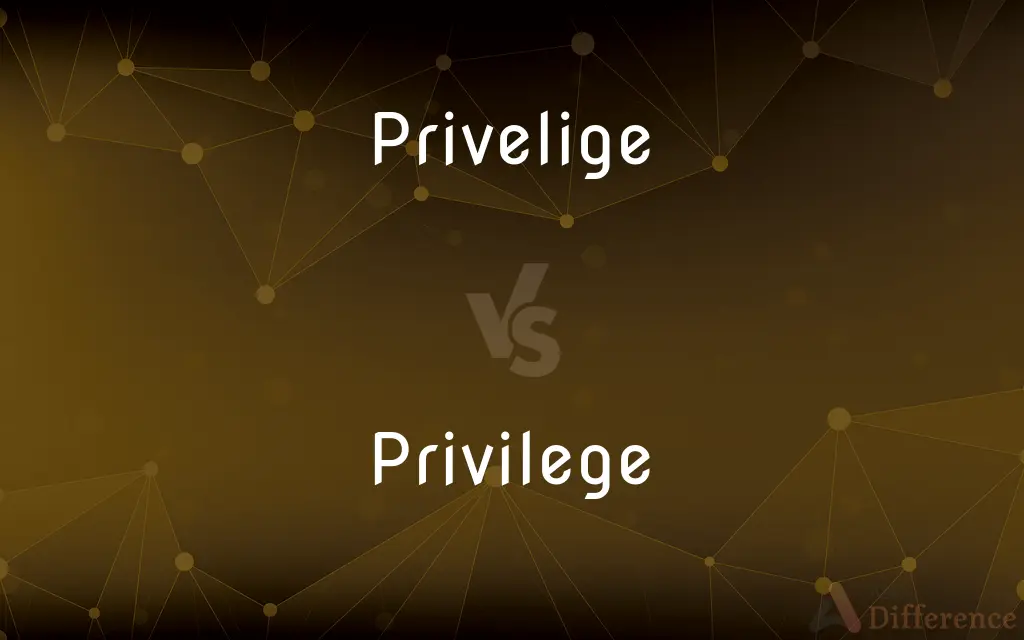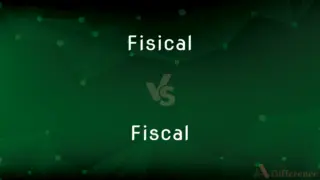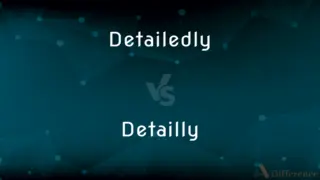Privelige vs. Privilege — Which is Correct Spelling?
By Tayyaba Rehman — Updated on March 29, 2024
"Privelige" is an incorrect spelling. The correct form is "Privilege," referring to a special right or advantage granted to a specific group.

Table of Contents
Which is correct: Privelige or Privilege
How to spell Privilege?

Privelige
Incorrect Spelling

Privilege
Correct Spelling
ADVERTISEMENT
Key Differences
Visualize the word associated with a VIP pass, emphasizing the correct spelling.
Think of "i before e" in the first part of "privilege."
Remember the word "private," which shares the "priv-" prefix.
Sound out the word: "priv-i-lege," which can guide correct spelling.
Recall popular phrases like "white privilege" to keep the correct spelling in mind.
ADVERTISEMENT
How Do You Spell Privilege Correctly?
Incorrect: It's a privelige to live in a community that supports each other.
Correct: It's a privilege to live in a community that supports each other.
Incorrect: Being able to travel is a privelige that she does not underestimate.
Correct: Being able to travel is a privilege that she does not underestimate.
Incorrect: Having access to clean water is a basic privelige many take for granted.
Correct: Having access to clean water is a basic privilege many take for granted.
Incorrect: The students earned the privelige to go on the field trip by maintaining good grades.
Correct: The students earned the privilege to go on the field trip by maintaining good grades.
Incorrect: He felt it was a privelige to be chosen for the team.
Correct: He felt it was a privilege to be chosen for the team.
Privilege Definitions
It can signify immunity granted beyond common advantages.
Diplomatic immunity is a privilege, not a right.
"Privilege" refers to an opportunity to do something considered rewarding.
It's a privilege to serve the community.
In computing, "privilege" denotes a right granted to a user.
Administrative privileges allow software installation.
"Privilege" denotes a special right or advantage exclusive to a particular group.
VIP members have the privilege of early access.
The term can refer to something considered an honor.
Meeting the president was a privilege.
A special right, advantage, or immunity granted or available only to a particular person or group
Education is a right, not a privilege
He has been accustomed all his life to wealth and privilege
Grant a privilege or privileges to
English inheritance law privileged the eldest son
A special advantage, immunity, permission, right, or benefit granted to or enjoyed by an individual, class, or caste.
Such an advantage, immunity, or right held as a prerogative of status or rank, and exercised to the exclusion or detriment of others.
The principle of granting and maintaining a special right or immunity
A society based on privilege.
Protection from being forced to disclose confidential communications in certain relationships, as between attorney and client, physician and patient, or priest and confessor.
Protection from being sued for libel or slander for making otherwise actionable statements in a context or forum where open and candid expression is deemed desirable for reasons of public policy.
An option to buy or sell a stock, including put, call, spread, and straddle.
To grant a privilege to.
To free or exempt.
To assign greater importance or priority to
“A Harvard Law grad who taught constitutional law at the University of Chicago, he is steeped in a tradition that privileges the Bill of Rights over the crude or arbitrary exercise of power” (Evan Thomas).
An exemption from certain laws granted by the Pope.
(countable) A particular benefit, advantage, or favor; a right or immunity enjoyed by some but not others; a prerogative, preferential treatment.
All first-year professors here must teach four courses a term, yet you're only teaching one! What entitled you to such a privilege?
An especially rare or fortunate opportunity; the good fortune (to do something).
(uncountable) The fact of being privileged; the status or existence of (now especially social or economic) benefit or advantage within a given society.
A right or immunity enjoyed by a legislative body or its members.
A stock market option.
(legal) A common law doctrine that protects certain communications from being used as evidence in court.
Your honor, my client is not required to answer that; her response is protected by attorney-client privilege.
(computing) An ability to perform an action on the system that can be selectively granted or denied to users.
(archaic) To grant some particular right or exemption to; to invest with a peculiar right or immunity; to authorize
To privilege representatives from arrest
(archaic) To bring or put into a condition of privilege or exemption from evil or danger; to exempt; to deliver.
A peculiar benefit, advantage, or favor; a right or immunity not enjoyed by others or by all; special enjoyment of a good, or exemption from an evil or burden; a prerogative; advantage; franchise.
He pleads the legal privilege of a Roman.
The privilege birthright was a double portion.
A people inheriting privileges, franchises, and liberties.
See Call, Put, Spread, etc.
To grant some particular right or exemption to; to invest with a peculiar right or immunity; to authorize; as, to privilege representatives from arrest.
To privilege dishonor in thy name.
To bring or put into a condition of privilege or exemption from evil or danger; to exempt; to deliver.
He took this place for sanctuary, And it shall privilege him from your hands.
A special advantage or immunity or benefit not enjoyed by all
A right reserved exclusively by a particular person or group (especially a hereditary or official right);
Suffrage was the prerogative of white adult males
(law) the right to refuse to divulge information obtained in a confidential relationship
Bestow a privilege upon
Privilege Meaning in a Sentence
With privilege comes the obligation to help those who are less fortunate.
The children saw staying up late as a special privilege.
The privilege of voting comes with the responsibility to be informed.
Access to this information is a privilege granted only to a select few.
It's a privilege to be able to work with such talented individuals.
Traveling the world is a privilege that offers invaluable experiences.
He acknowledged his privilege in being able to attend such a prestigious school.
Only a few have the privilege of accessing this exclusive club.
Education is a privilege that should be available to everyone.
The privilege to study abroad opens up many educational opportunities.
She considered the privilege of teaching as her most rewarding experience.
The privilege of driving requires following the rules of the road.
They did not take the privilege of free speech for granted.
The privilege of leading the team was given to the most experienced player.
The privilege of early access was given to loyal customers.
The privilege of parental leave is not afforded to everyone.
Having a platform to share your voice is a significant privilege.
The privilege of working from home has made many reconsider their work-life balance.
The new members were aware of the privilege they had been given to join the organization.
Enjoying the privilege of a healthy environment is essential for everyone.
They thanked their mentor for the privilege of learning under his guidance.
The privilege of privacy is something many people cherish.
Experiencing the privilege of nature’s beauty in national parks is breathtaking.
The privilege of attending the premiere was a highlight of her career.
Acknowledging one's own privileges is the first step towards understanding social inequalities.
Common Curiosities
What is the root word of Privilege?
The root is derived from Latin "privilegium."
Which conjunction is used with Privilege?
Any conjunction can be used based on the context.
Why is it called Privilege?
It comes from the Latin "privilegium," meaning a law affecting one individual.
What is the verb form of Privilege?
The verb form is "privilege," as in "to privilege someone."
What is the pronunciation of Privilege?
Pronounced as /ˈprɪv.əl.ɪdʒ/.
Which vowel is used before Privilege?
Typically, "a" as in "a privilege."
What is the singular form of Privilege?
Privilege.
Is Privilege a noun or adjective?
It is primarily a noun.
Is Privilege an adverb?
No.
What is the plural form of Privilege?
Privileges.
Which article is used with Privilege?
"A" or "the."
Is Privilege a vowel or consonant?
"Privilege" is a word, not a single letter.
Which preposition is used with Privilege?
"Of" as in "privilege of."
What is the opposite of Privilege?
Disadvantage or deprivation.
What is the second form of Privilege?
Privileged (for the verb form).
Is Privilege a negative or positive word?
Neutral; the connotation depends on context.
Is Privilege a collective noun?
No.
How many syllables are in Privilege?
Three syllables.
How do we divide Privilege into syllables?
Priv-i-lege.
What is the first form of Privilege?
Privilege (both noun and verb forms).
Is the Privilege term a metaphor?
No, but it can be used metaphorically.
Is the word Privilege imperative?
No.
Which determiner is used with Privilege?
Determiners such as "this" or "that" can be used.
Is Privilege an abstract noun?
Yes.
Is Privilege a countable noun?
Yes.
What is a stressed syllable in Privilege?
The first syllable, "Priv."
What part of speech is Privilege?
Noun (and sometimes verb).
What is another term for Privilege?
Advantage.
What is the third form of Privilege?
Privileged (for the verb form).
How is Privilege used in a sentence?
"Being part of this community is a great privilege."
Share Your Discovery

Previous Comparison
Fisical vs. Fiscal
Next Comparison
Detailedly vs. DetaillyAuthor Spotlight
Written by
Tayyaba RehmanTayyaba Rehman is a distinguished writer, currently serving as a primary contributor to askdifference.com. As a researcher in semantics and etymology, Tayyaba's passion for the complexity of languages and their distinctions has found a perfect home on the platform. Tayyaba delves into the intricacies of language, distinguishing between commonly confused words and phrases, thereby providing clarity for readers worldwide.













































